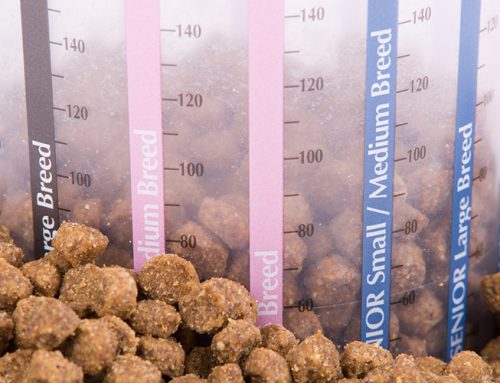Is Your Dog Allergic to its Food?
Dogs, like humans, experience allergies. Environmental factors like pollen or changing seasons can play a part. Your dog could even be allergic to you. But that’s pretty rare. The most common allergy for dogs is found in their food bowl. Food allergies make up about 10 percent of dog allergy cases. Dogs can also have food intolerance issues. While allergies and intolerance are not the same things, both impact your dog’s health and well-being and can have unfortunate side effects like flatulence and excessive itching.
Beef, chicken and dairy are the most common sources of food intolerance or allergies for dogs and among the most common ingredients found in dog food — along with turkey and lamb.
Pets aren’t born with food allergies. Allergies can develop over time and repetition. Your dog may happily eat lamb for years and then start to manifest symptoms. Genetics can also play a role in dog allergies. Some breeds may be more prone to allergy development.
Rotating proteins and carbs can help reduce the likelihood of a dog developing a food allergy, but if your dog is already showing symptoms of a food intolerance, you’ll need to determine what protein is causing symptoms first.
While there are dog allergy skin and blood tests, the most cost effective way to determine what food is causing your dog issues is an elimination diet, which is sometimes called a restricted diet. This process takes longer, but can be done by the dog owner.
Allergy and Food Intolerance Symptoms
Excessive itching
Vomiting
Diarrhea
Unhealthy/lustreless skin/coat
Chronic ear or foot infections
Excessive yeasty/corn chip smell
Dark red paws (look between the toe pads)
Hives
Facial swelling
Sneezing
Runny nose and eyes
Constant licking
Itchy rear end
Chronic gas
Hair loss
Skin lesions
Of course, some of these symptoms are indicative of other illnesses. If your dog throws up once after a meal, that’s not necessarily indicative of an allergy or food intolerance. Look for patterns and consistency to help determine if your dog’s food is causing the upset.
More seriously, an allergic dog can go into anaphylactic shock. If your dog has red, swollen skin or muzzle, excessive drooling, difficulty breathing or a blushing color on its tongue and gums, contact your vet immediately. Bee stings are common causes of anaphylactic shock, but sometimes a flavoring in a treat or dental chew can cause unexpected reactions.
A discussion with your vet is also important so you can rule out more serious problems, and you will need to make sure your dog is treated for issues like ear infections. Some vets may recommend an antihistamine to get the symptoms under control. Your vet may also recommend a hypoallergenic dog food made up of a hydrolyzed protein. Hydrolyzed proteins are designed to prevent immune system response.
Determine What Food is Causing Symptoms
Figuring out what is bothering your dog takes effort and can be time consuming. You may want to record what you feed your dog and your dog’s response to the food, as elimination diets typically take a minimum of eight weeks. A vet can help create an elimination diet or provide recommendations before you get started.
If your dog eats pet food with common ingredients like beef, you may need to try novel proteins, which are often more expensive. Novel proteins include rabbit, venison, duck, buffalo/bison, kangaroo, and less common carbs include pumpkin, oats, barley, quinoa and chickpeas.
Start with an Elimination (or Restricted) Diet
Build a cross section of what your dog can eat without symptoms, and rotate the proteins and carbs from these foods once you’ve completed your elimination diet. Discouragingly, dogs can develop new allergies at various stages of life and you may need to go through the process more than once.
Become an avid food label reader. Dog food and treats can be as complicated as human food and may contain ingredients you’re not expecting.

Once your dog is asymptomatic, you can also try some supplements to improve their coat and reduce itching. Options include fish oil, flax and coconut oil.





